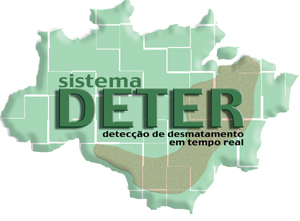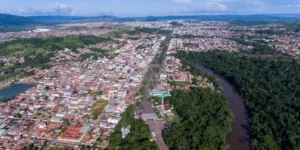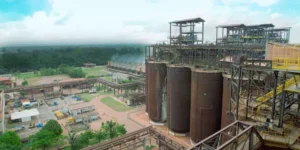I’ve just read, moved and saddened, an article that appeared in today’s edition of Folha de S. Paulo. Special envoy Lucas Reis denounces the evil practiced against the residents of Nova Olinda do Norte, in neighboring Amazonas. These people lost their sight after being treated for cataracts in 2011 and were never compensated.
Nova Olinda entered my imagination through my father, who was at the Petrobrás base right after the big event: on May 13, 1955, oil gushed into the Amazon for the first time. As a child, I saw photos of my father in installations that looked more like Hollywood movie sets.
Dad was a state deputy for the PTB in Pará, elected for Santarém and the Lower Amazon at the start of his term. At his invitation, he accompanied the delegation of the governor of Amazonas, Plínio Coelho, also from the PTB (also the party of President Getúlio Vargas). That seemed to be the first chapter in the region’s redemption after the end of rubber exploitation.
The Amazon, as the holder of the largest sedimentary basin on the planet, was “destined”, due to its geology, to accumulate hydrocarbons. Nova Olinda was the proof of the nines. Hence everyone’s enthusiasm, including my father, who passed it on to the family. Everyone wanted to see the oil gushing out and falling on the most daring, who tried to bring their sample of the black gold, even in their clothes.
Over the next two years, five new boreholes were drilled around the pioneering well. Oil came up again from the rigs, but the wells were not developed because an American geologist, Walter Link, hired by Petrobrás, guaranteed that the volume contained was not commercial. It wouldn’t be worth the investment. As a result, the wells were sealed and Mr. Link’s claim was never tested in the field.
The episode became yet another chapter in the conspiracy theory against the Amazon. In this case, it was put into practice by a Rockefeller emissary to sabotage Petrobras’ search for oil. Years after my father, I went to Nova Olinda, which is 150 kilometers from Manaus. I was thrilled to be there and saddened by the abandonment it had been left in after so much optimism.
Abandonment attested to by today’s Folha report. That’s why I’m reproducing the following text. It should be read by everyone. It’s a strong example of the scorn for the people of the countryside.
“If I leave home alone, I don’t know if I’ll come back alive,” one of the 18 patients who suffered sequelae told the reporter
Seu Antônio, 73, lives near the Madeira River, but no longer eats fish. Dona Senhorinha, 64, has to lean on clotheslines to get to her yard. Carpenter Seu Raimundo, 95, retired three years ago and has been forced to live locked in his house.
The story of 18 elderly people from the small town of Nova Olinda do Norte (135 km from Manaus) changed radically in April 2011, when a series of cataract surgeries by the Amazonas state government ended in permanent blindness.
Almost four years later, the elderly are trying to survive with the help of relatives and friends in a town of 34,000 inhabitants, accessible only by river, with little infrastructure and no support from the government.
Waiting for justice, at least 5 of the 18 elderly people have died since then, one of them after complications from blindness: after a fall, he had to have a leg amputated and wasted away.
“Our lives are over. We can no longer do anything properly. What can I do now? Just die,” says carpenter Raimundo Barros Neto, 95.
MUTIRÃO
In March 2011, the Amazonas government’s joint effort landed in Nova Olinda do Norte to carry out 36 cataract surgeries. Hours later, half of the patients had red eyes, stabbing pains, heat, secretions and, finally, blurred vision and blindness.
Days later, the elderly were taken to a hospital in Manaus, but the condition was irreversible.
“I could see and worked as a mechanic. I went blind in one eye, and now I have problems with my other eye too. I went into depression, that was the end of my life,” says Edmilson Freitas, 71, standing next to the abandoned workshop in his backyard.
After almost two weeks in hospital and receiving eye drops, the elderly men say, they were taken back to Nova Olinda, but never received any explanation or satisfaction about the case. “They said we’d be able to see again in a month,” says Freitas, who still feels pain in his eye.
“My eye was full of bacteria when I went to another doctor. He said my eye looked like wet cotton,” says Antônia Reis, 70.
At that moment, they all began to discover what it was like to live in the dark.
“I don’t eat fish anymore because of the thorns. It was my favorite thing to eat,” says Antônio Aureliano da Silva, 73. ”And I don’t go out alone anymore.”
The elderly suffer from constant falls and injuries to their feet, and are unable to feed themselves, let alone walk around the city without someone to support them. “If I leave the house on my own, I don’t know if I’ll come back alive,” says Francisco Rolim, 81, who was also forced to stop working, like Railde Lima, 65.
Jandira Lemos, 79, who already had problems with one eye, became totally blind. At night, she complains of pain.
Hardly any of them can make out a face. “I only see shadows, and I can only recognize my children because of their voices,” says Senhorinha da Silva, 64.
Some of them sought out lawyers and tried to file a collective action for compensation, but the process did not go ahead. “We won’t be able to see again. Our hope is that justice will be done,” says Freitas.








